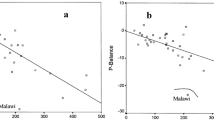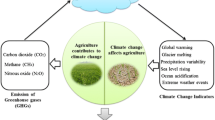Abstract
Agriculture-related discussions in climate change research have been largely focused on the effects of a changing environment on agriculture and the possible consequences for global and regional food security. However, from a policy standpoint, it is also essential to address the impact of agriculture and related activities on environmental change. Over the last 50 years, most of the world’s agriculture has transitioned into industrial agriculture that requires greater inputs of fossil-fuel energy, water, synthetic pesticides and fertilizers, which have created substantial harmful effects on air, soil, water and biodiversity. Sustainable farming that uses less chemicals and fossil-fuel energy and emphasizes localized production and consumption has come to be viewed as an eco-friendly alternative to modern agriculture. This paper will examine the concept of sustainable agriculture and compare and contrast its practice in Canada and Cuba. The paper will conclude with lessons that the two countries can learn from each other.
Similar content being viewed by others
References
Agriculture and Agri-Food Canada. (2006). Making progress together: Sustainable development strategy 2007–2009. Ottawa: Author. Retrieved February 17, 2008, from http://www4.agr.gc.ca/resources/prod/doc/policy/environment/pdfs/sds/sds4_e.pdf.
Barker, D. (2007). The rise and predictable fall of globalized industrial agriculture. San Francisco, CA: International Forum on Globalization.
Canada NewsWire. (2008). Agriculture’s climate change role demands urgent action. Ottawa: Canada NewsWire.
Chen, R. S. (1990). Global agriculture, environment, and hunger: Past, present, and future links. Environmental Impact Assessment Review, 10(4), 335–358.
Forge, F. (2004). Organic farming in Canada: An overview. Ottawa, Canada: Library of Parliament, Parliamentary Information and Research Service. Retrieved December 15, 2008, from http://www.parl.gc.ca/information/library/PRBpubs/prb0029-e.htm.
Funes, F., et al. (2005). Sustainable agriculture and resistance: Transforming food production in Cuba. Oakland, California: Food First.
Gifford, A. (2002). Food fighters [Hundreds of years of sustainable farming methods have taken a back seat to multinational agribusinesses that treat food as a big money commodity]. This, 35(6), 22.
Global Exchange (1999). Alternative nobel prize goes to Cuban group promoting the organic revolution. Retrieved February 17, 2009, from http://www.globalexchange.org/countries/americas/cuba/sustainable/susAgriculture/rightLivelihood.html.pf.
Global Exchange (2003). The united nations qualified the Cuban model on city agriculture as very successful. Retrieved February 17, 2009, from http://www.globalexchange.org/countries/americas/cuba/sustainable/susAgriculture/1243.html.
Gonzalez, C. (2003). Seasons of resistance: Sustainable agriculture and food security in Cuba. Tulane Environmental Law Journal, 16, 685–732.
Goodall, J., McAvoy, G., & Hudson, G. (2005). Harvest for hope. New York: Time warner book group.
Greenpeace International. (2008). Cool farming: Climate impacts of agriculture and mitigation potential. Amsterdam, The Netherlands: Greenpeace International.
Holm, W. (2006). Canada-Cuba farmer to farmer project. Project rationale. Retrieved February, 20, 2008, from http://www.farmertofarmer.ca/rationale.html.
Janzen, H. H., Desjardins, R. L., Asselin, J. M. R., & Grace, B. (1998). The health of our air: Towards sustainable agriculture in Canada. Ottawa: Agriculture and Agri-Food Canada. Retrieved February 17, 2008, from http://www.agr.gc.ca/nlwis-snite/pub/ha_sa/pdf/intro_e.pdf.
Kimbrell, A. (2002). Introduction. In A. Kimbrell (Ed.), The fatal harvest reader: The tragedy of industrial agriculture (pp. xi–xiv). Sausalito, California: Foundation for Deep Ecology.
Kozak, D. (2005). Book review. [Review of the book Slaughterhouse blues: The meat and poultry industry in North America]. Culture and Agriculture, 27(1), 69–70.
Lefebvre, A. & Strain, G. (2006). Using agri-environmental indicators to support the development of agricultural policy: The Canadian experience. In F. J. Hani, L. Pinter, & H. R. Herren (Eds.), Sustainable agriculture: From common principles to common practice (pp. 171–188). Proceedings and outputs of the first Symposium of the International Forum on Assessing Sustainability in Agriculture (INFASA), March 16, 2006, Bern, Switzerland. Retrieved February 17, 2008, from http://www.iisd.org/pdf/2007/infasa_common_principles.pdf.
Levins, R. (2005). How Cuba is going ecological. Capitalism, Nature, Socialism, 16(3), 7–26.
Lynch, K. (2002). Urban agriculture. In V. Desai & R. B. Potter (Eds.), The companion to development studies (pp. 268–272). London: Arnold.
MacAdam, M. (2002). From the roots up. Retrieved January 15, 2009, from http://www.sustainabletimes.ca/articles/CSAfarms.htm.
MacRae, R. (1990). A history of sustainable agriculture in Canada. Ste-Anne-de-Bellevue, Quebec: McGill University. Retrieved February 17, 2008, from http://www.eap.mcgill.ca/AASA_1.htm.
Madeley, J. (2002). Food for all: The need for a new agriculture. Halifax, NS: Fernwood.
Martz, D. J., & Brueckner, I. S. (2003). The Canadian family farm at work: Exploring gender and generation. Saskatchewan: Center for Rural Studies and Enrichment at St. Peter’s College and National Farmers Union.
Maxey, L. (2006). Can we sustain sustainable agriculture? Learning from small-scale producer-suppliers in Canada and the UK. The Geographical Journal, 172(3), 230–244.
Maynard, H., & Nault, J. (2005). Big farms, small farms: Strategies in sustainable agriculture to fit all sizes. Agricultural Institute of Canada. Retrieved February 17, 2008, from http://www.aic.ca/about/pr_docs/AIC_discussion_paper_Final_ENG.pdf.
Miller, G. T., & Hackett, D. (2008). Living in the environment (1st Canadian ed.). Ontario: Thomson Nelson.
Perlas, N. (1995). The seven dimensions of sustainable agriculture. In V. Shiva & I. Mosher (Eds.), Biopolitics (pp. 234–266). London & New Jersey: Zed Books.
Picone, C., & Van Tassel, D. (2002). Agriculture and biodiversity loss: Industrial agriculture. In N. Eldredge (Ed.), Life on earth: An encyclopedia of biodiversity, ecology, and evolution (pp. 99–105). Santa Barbara, California: ABC-CLIO.
Pretty, J. (1994). Regenerating agriculture. London, UK: International Institute for Environment and Development.
Pretty, J. (2002). Regenerating agriculture. In V. Desai & R. B. Potter (Eds.), The companion to development studies (pp. 170–175). London: Arnold.
Ritchie, M. (1994). Impacts of NAFTA on sustainable agriculture. Paper Presented to the conference on Trade and Environment John F. Kennedy School of Government, Harvard University, Cambridge, MA, April 29-30, 1994. Retrieved February 17, 2008, from http://www.ap.harvard.edu/mainsite/papers/tne/ritchie/ritchie.html.
Roppel, C., Desmarais, A., & Martz, D. (2006). Farm women and Canadian agricultural policy. Ottawa, Ontario: Status of Women Canada.
Rosset, P. (1994). Organic farming in Cuba. Multinational monitor. Retrieved February 20, 2008, from http://multinationalmonitor.org/hyper/issues/1994/11/mm1194_06.html.
Rosset, P. (2000). Cuba: A successful case study of sustainable agriculture. In F. Magdoff, J. B. Foster, & F. H. Buttel (Eds.), Hungry for profit: the agribusiness threat to farmers, food and the environment (pp. 203–213). New York: Monthly Review Press.
Saney, I. (2004). Cuba: A revolution in motion. Blackpoint, NS: Fernwood.
Schaller, N. (1993). Sustainable agriculture and the environment: The concept of agricultural sustainability. Agriculture, Ecosystems & Environment, 46(1–4), 89–97.
Shiva, V. (1993). Monocultures of the mind. London & New York: Zed.
Strang, N. (2006). What is “sustainable agriculture.” Canadian agriculture at a glance. Ottawa: Statistics Canada. Retrieved February 17, 2008, from http://www.statcan.ca/english/research/96-328-MIE/2004017/96-328-MIE2004017.pdf.
Sullivan, R. E. (2000, July 13). Cuba producing, perhaps, ‘cleanest’ food in the world. Earth Times News Service. Retrieved February 17, 2008, from http://www.globalexchange.org/countries/americas/cuba/sustainable/susAgriculture/earthTimes071300.html.
Szirmai, A. (2005). The dynamics of socio-economic development. UK: Cambridge University Press.
Tharamangalam, J. (2008) Can Cuba offer an alternative to corporate control over the world’s food system. Retrieved October 15, 2009, from http://www.globaljusticecenter.org/articles/report_cubafood.html.
Vallianatos, E. (2006). Humanity’s ecological footprint. Mediterranean Quarterly, 17(3), 65–85.
Zytaruk, M. (2003). Life after oil; Cuba’s fossil fuel shortage has inspired innovations that combine sustainable agriculture and renewable energy. Alternatives Journal, 29(4), 22.
Author information
Authors and Affiliations
Corresponding author
Additional information
Readers should send their comments on this paper to BhaskarNath@aol.com within 3 months of publication of this issue.
Rights and permissions
About this article
Cite this article
Hiranandani, V. Sustainable agriculture in Canada and Cuba: a comparison. Environ Dev Sustain 12, 763–775 (2010). https://doi.org/10.1007/s10668-009-9223-2
Received:
Accepted:
Published:
Issue Date:
DOI: https://doi.org/10.1007/s10668-009-9223-2




